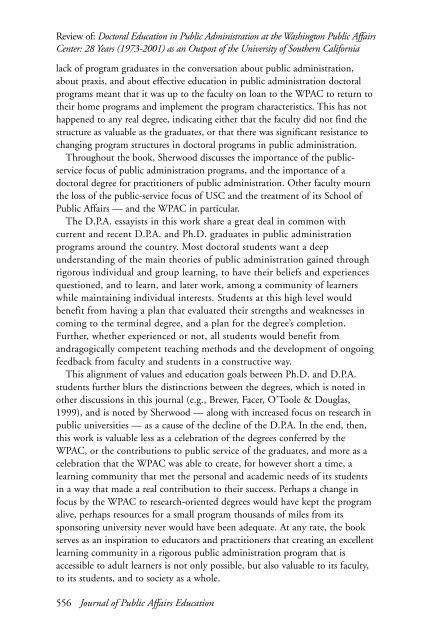JOURNAL OF PUBLIC AFFAIRS EDUCATION - National ...
JOURNAL OF PUBLIC AFFAIRS EDUCATION - National ...
JOURNAL OF PUBLIC AFFAIRS EDUCATION - National ...
You also want an ePaper? Increase the reach of your titles
YUMPU automatically turns print PDFs into web optimized ePapers that Google loves.
Review of: Doctoral Education in Public Administration at the Washington Public Affairs<br />
Center: 28 Years (1973-2001) as an Outpost of the University of Southern California<br />
lack of program graduates in the conversation about public administration,<br />
about praxis, and about effective education in public administration doctoral<br />
programs meant that it was up to the faculty on loan to the WPAC to return to<br />
their home programs and implement the program characteristics. This has not<br />
happened to any real degree, indicating either that the faculty did not find the<br />
structure as valuable as the graduates, or that there was significant resistance to<br />
changing program structures in doctoral programs in public administration.<br />
Throughout the book, Sherwood discusses the importance of the publicservice<br />
focus of public administration programs, and the importance of a<br />
doctoral degree for practitioners of public administration. Other faculty mourn<br />
the loss of the public-service focus of USC and the treatment of its School of<br />
Public Affairs — and the WPAC in particular.<br />
The D.P.A. essayists in this work share a great deal in common with<br />
current and recent D.P.A. and Ph.D. graduates in public administration<br />
programs around the country. Most doctoral students want a deep<br />
understanding of the main theories of public administration gained through<br />
rigorous individual and group learning, to have their beliefs and experiences<br />
questioned, and to learn, and later work, among a community of learners<br />
while maintaining individual interests. Students at this high level would<br />
benefit from having a plan that evaluated their strengths and weaknesses in<br />
coming to the terminal degree, and a plan for the degree’s completion.<br />
Further, whether experienced or not, all students would benefit from<br />
andragogically competent teaching methods and the development of ongoing<br />
feedback from faculty and students in a constructive way.<br />
This alignment of values and education goals between Ph.D. and D.P.A.<br />
students further blurs the distinctions between the degrees, which is noted in<br />
other discussions in this journal (e.g., Brewer, Facer, O’Toole & Douglas,<br />
1999), and is noted by Sherwood — along with increased focus on research in<br />
public universities — as a cause of the decline of the D.P.A. In the end, then,<br />
this work is valuable less as a celebration of the degrees conferred by the<br />
WPAC, or the contributions to public service of the graduates, and more as a<br />
celebration that the WPAC was able to create, for however short a time, a<br />
learning community that met the personal and academic needs of its students<br />
in a way that made a real contribution to their success. Perhaps a change in<br />
focus by the WPAC to research-oriented degrees would have kept the program<br />
alive, perhaps resources for a small program thousands of miles from its<br />
sponsoring university never would have been adequate. At any rate, the book<br />
serves as an inspiration to educators and practitioners that creating an excellent<br />
learning community in a rigorous public administration program that is<br />
accessible to adult learners is not only possible, but also valuable to its faculty,<br />
to its students, and to society as a whole.<br />
556 Journal of Public Affairs Education

















